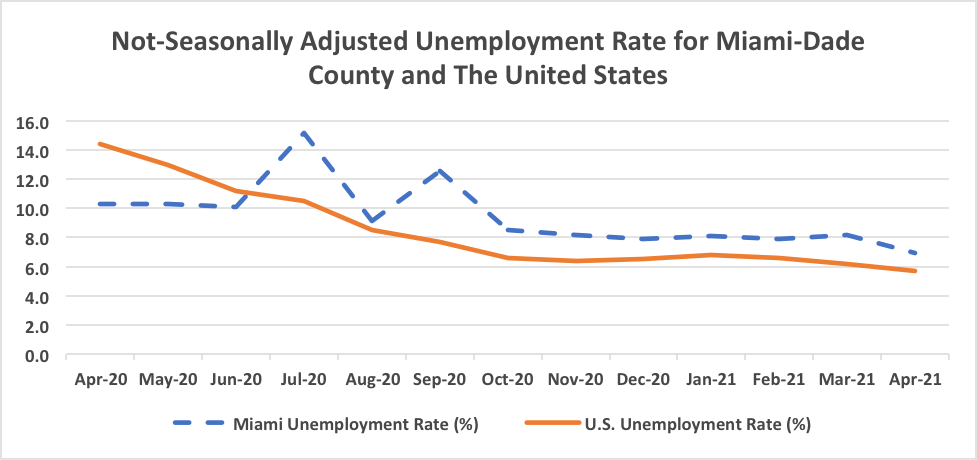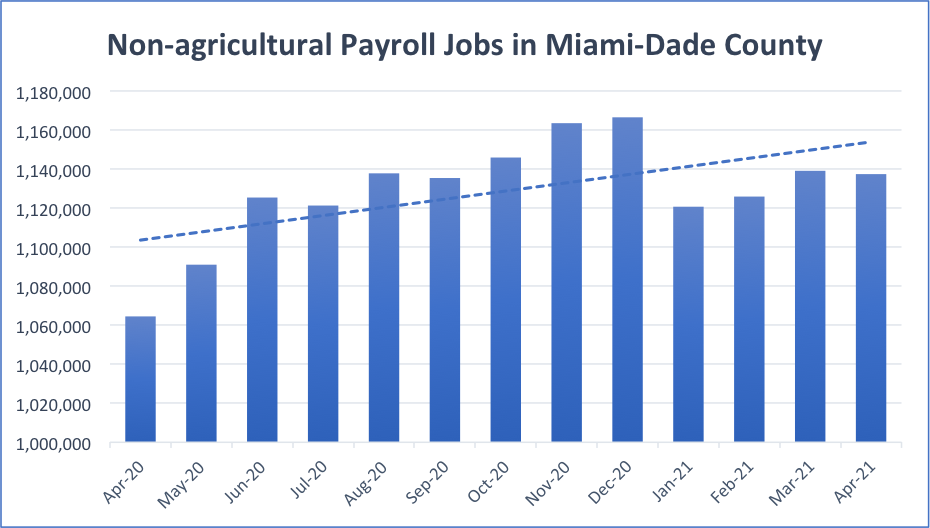As Miami-Dade County is slowly returning to life after the pandemic, unemployment rates have decreased at the local and national levels. The unemployment rate decreased by 3.4% from April of 2020 (10.3%) to April of 2021 (6.9%). Compared to last month (March), the unemployment rate decreased by 1.3% from 8.2% to 6.9%.

Note: The Miami metro area labor force statistics use a different measurement method than all other counties in Florida. The information for the monthly employment and unemployment estimates come from Current Population Survey (CPS). There are only seven large areas across the nation which uses this labor force statistics model. The graph compares the unemployment rate for Miami-Dade County with that of the United States since April of 2020.
Non-agricultural Payroll Jobs (not seasonally adjusted) – Miami-Dade County
- From March 2021 to April 2021, there was a decrease of 1,700 nonagricultural payroll jobs, a decrease of -0.1%. A few sectors, including government saw a decline in the number of employees.
- Nonagricultural payroll jobs increased by 103,400 from April 2020 to April 2021, a 10% increase.

Although most industries did not experience a great increase in number of jobs compared to March, most industries gained jobs compared to April of 2020. These industries include professional and business services, other services and leisure and hospitality. The leisure and hospitality industry experienced the highest increase in jobs with 57% increase from April of 2020. This was to be expected as this industry also lost the largest number of jobs at the beginning of the pandemic.
| Nonagricultural EmploymentMiami-Miami Beach-Kendall MD (Not Seasonally Adjusted) | ||||
| March 2021 to April 2021 change | Apr 2020 to April 2021 change | |||
| Industry | Level | Percent | Level | Percent |
| Leisure and Hospitality | 1,000 | 0.9% | 40,200 | 57.0% |
| Retail Trade | -300 | -0.2% | 18,800 | 16.6% |
| Other Services | 800 | 1.8% | 6,600 | 16.6% |
| Professional and Business Services | 2,400 | 1.3% | 23,800 | 14.7% |
| Manufacturing | -300 | -0.7% | 3,400 | 9.2% |
| Education and Health Services | -100 | -0.1% | 8,800 | 4.9% |
| Financial Activities | 500 | 0.6% | 3,500 | 4.5% |
| Wholesale Trade | 100 | 0.1% | 1,800 | 2.7% |
| Construction | -1,400 | -2.7% | 800 | 1.6% |
| Transportation, Warehousing, and Utilities | -2,400 | -3.0% | 1,200 | 1.6% |
| Information | -100 | -0.5% | 0 | 0.0% |
| Total Government | -1,900 | -1.4% | -5,500 | -3.8% |
All Counties shown below have improved unemployment rates compared to April of 2020, with Palm Beach County showing the lowest rate.
| April 2021 Unemployment Rate (Not Seasonally Adjusted) | April 2020 to April 2021 Unemployment Rate Change (Not Seasonally Adjusted) | |
| Miami-Dade County | 6.9% | +3.4% |
| Broward County | 5.3% | +11.1% |
| Palm Beach County | 4.7% | +10% |
| Florida | 5.1% | +8.8% |
| United States | 6.6% | +8.7% |
Unemployment Rate Improves in Miami-Dade County (seasonally adjusted)
Seasonally adjusted unemployment rates, which take seasonal fluctuations into consideration, also show a downward trend in unemployment rates. In April 2021, the seasonally adjusted unemployment rate for Miami-Dade County was 7.7%, which is 2.6% lower than in April 2020 (10.3%). The unemployment rate is 0.4% lower than in March of 2021 when it was at 8.1%.

From the data and analysis above, we continued to observe lower unemployment rates, which signals economic recovery. The community needs to remain focused on job-retention projects in targeted industries, as well as all sectors. These industries have been identified as the Miami-Dade County industries most able to create additional well-paying job opportunities, leading to an improved quality of life for Miami-Dade County residents. The Miami-Dade Beacon Council continues to aggressively work on attracting new companies to our community and work on the expansion and retention of existing business. For more information, visit www.beaconcouncil.com.
Sources
The job creation numbers are derived from the U.S. Bureau of Labor Statistics Current Employment Statistics Program (CES), and only account for non-farm payroll jobs. However, the unemployment rates are derived from the U.S. Bureau of Labor Statistics Local Area Unemployment Statistics Program (LAUS), which includes farm payroll jobs as well as self-employed workers.
In addition, the federal government typically conducts interviews in sample households to determine the unemployment rate. Miami-Dade County is one of six metropolitan areas in the United States that uses a different method solely based on a statistical model derived from several data sets.


